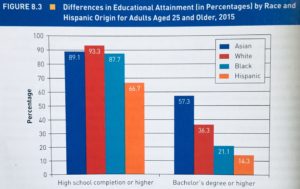Blog Post #3: Thinking About Social Issues
Three Social Issues
Social Issue #1: Education:
Presently, many professions and jobs have been locked away behind degrees, therefore flaws in the educational system have become more damaging to society. To clarify, for every student that fails to acquire a bachelor’s degree, society loses a professional employee and many opportunities are closed off for that individual. Due to the complex nature of education, there are many aspects of the problem that need to be tackled. For instance, student debt, quality of public education, the effects of race and gender on degree acquisition, and school violence are all issues that are still to be addressed. When it comes to historical background, debates over education and how its various aspects stretch back all the way past the ancient Romans and Greeks. In the Republic, Plato, an ancient Greek philosopher, writes that education is the key to reaching a higher state of being that is necessary for anybody entering politics. In other words, education has been a matter of debate for centuries and there is much material and history to explore. By the same token, there is also a rich statistical database provided by the U.S. Department of Education and many other contributors that addresses most of the aforementioned issues with education.

Social Issue #2: Work:
Being an essential part of every society, work and its related policies are subject to much change and criticism. Ideally, a full-time job should bring some satisfaction to the employee and provide a livable wage. Furthermore, work should provide a safe environment and the right to unionize. However, these aforementioned goals have not yet been achieved in all of the United States. Due to this, skilled workers are unemployed or underemployed and minimum wage workers struggle to survive. Moreover, the sociology professor, Anna Leon-Guerrero, states that, “According to the U.S. Bureau of Labor Statistics (2017h), there were 5,190 fatal work injuries in 2016” (1). To clarify, some workplaces are still hazardous to employees. Race and gender also play a role in these work issues by making certain individuals more vulnerable to unemployment and lower wages even if the certifications. Any of these work aspects that need improvement can be individually explored extensively. In order to address work issues, it is important to consider how recent events have changed the nature of the workplace. For example, the Industrial Revolution, Great Depression, and World War II have all contributed to major shifts in the demographics of employees and the nature of jobs available. The U.S. Bureau of Labor Statistics and many other reliable sources have collected valuable statistical information to aid in understanding the extent and effects of these work issues and the shifts displayed over time.

Social Issue #3: Medicine:
Despite being an essential part of life, healthcare is a major problem worldwide. The most obvious healthcare problems are in developing countries where epidemics commonly breakout and kill hundreds of people before being contained. However, even in developed countries healthcare is still an issue, especially in the United States. According to the sociology professor, Anna Leon-Guerrero, “Even though the U.S. health system is the most expensive in the world, ‘comparative analyses consistently show the United States underperforms relative to other countries on most dimensions of [health] performance’ (Davil. 2007:viii)”(1). In other words, the U.S. healthcare system is both overpriced and underperforming, which is a heavy burden on society’s members that now have to struggle to pay their medical bills. Furthermore, the United States’ healthcare system is ranked last for equity, which means that race and gender play a major role in the quality of healthcare a patient receives, and Anna Leon-Guerrero shockingly states that, “there is a 20-year gap in life expectancy between the most and least advantaged populations”(1). Overall, healthcare is a serious issue in most societies and the problems vary between countries. Due to the international scale of the problem, it is important to focus on one piece at a time. Moreover, the recent efforts to reduce healthcare costs in the United States through insurance and other means yields valuable insight into the nature of the problem and the effectiveness of the aforementioned efforts. Statistics concerning various aspects of the issue are provided by The World Health Organization, which provides information about international healthcare problems, and the National Center for Health Statistics, which provides more precise statistical information concerning only the United States.
In the United States, individuals struggle to deal with the overpriced healthcare system. Source: https://amp.cnn.com/cnn/2019/12/05/politics/us-health-care-spending-2018/index.html
Footnotes:
- Leon-Guerrero, Anna. Social Problems: Community, Policy and Social Action. 6th ed. Thousand Oaks, CA: SAGE Publications, Inc., 2019.


Great job with this Andrew! While all three are strong topics, I think the topic of the workplace has the most potential to explore because it is such a broad topic. Within this larger topic, you can focus in more on gender inequality in the workplace, conditions of the workplace, how education levels explore the work place, etc. I think with a little more detailed research any of these topics could be very strong.
Hi Andrew! I really like how you discussed each topic. As Megan said, I think that you can incorporate both education and healthcare into the workplace topic. You could do this by looking more into the workplace issues you mention and look into how the different levels of education tend to determine the job options that you have, which also links with healthcare because of the quality or level of a job you have, tends to also determine the quality of one’s healthcare and benefits. Overall, a great job! Very interesting topics and great perspectives on each. I look forward to seeing the direction you take with your project!